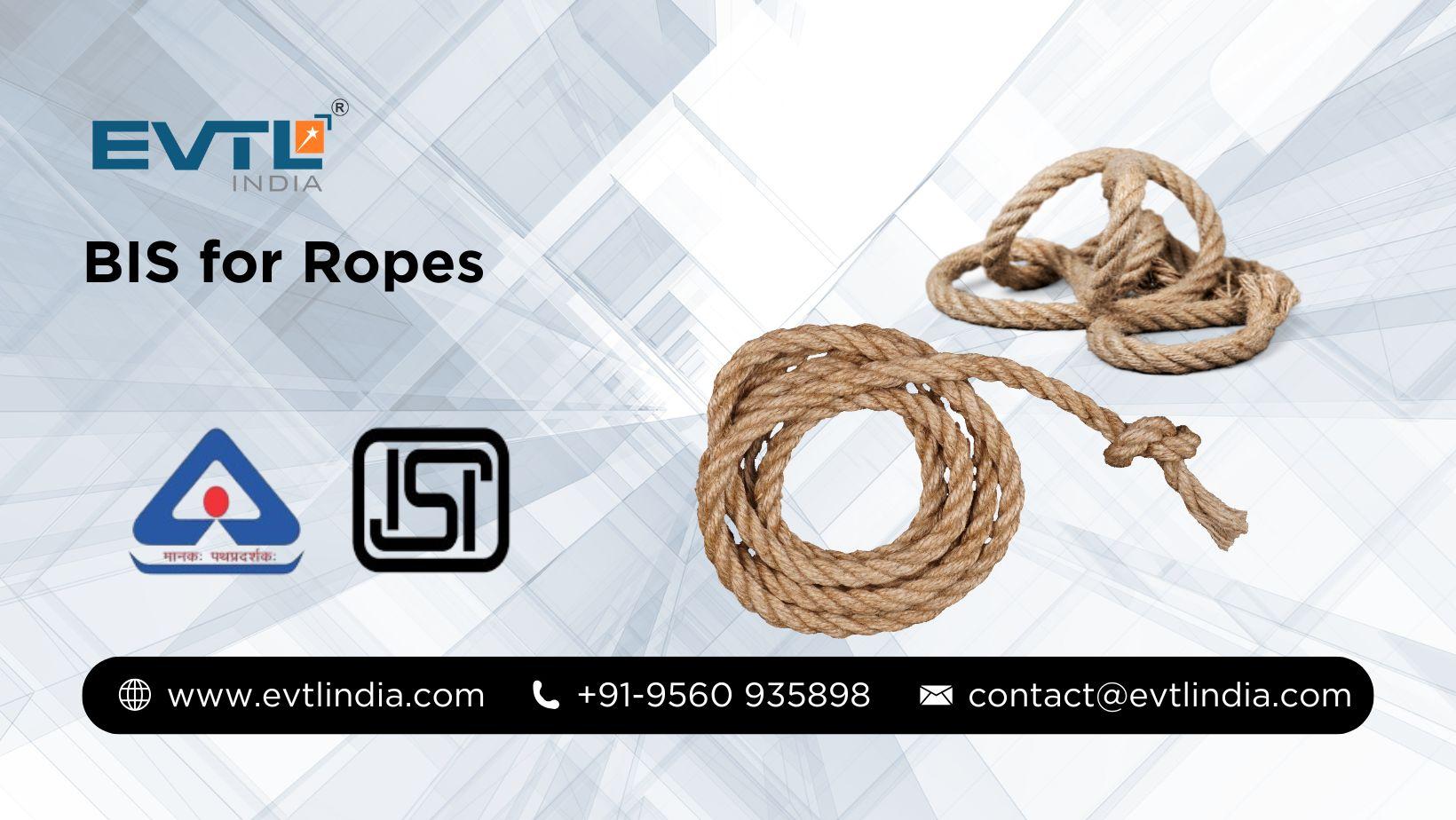A Complete Guide to BIS Certification for Ropes and Cordages: Ensuring Strength, Safety, and Compliance

Ropes and cordages have been an integral part of human life for centuries, used across industries such as shipping, construction, agriculture, mountaineering, and domestic applications. While they may seem like simple products, their performance directly impacts safety, durability, and reliability in countless operations. In India, ensuring the quality and safety of ropes and cordages falls under the purview of the Bureau of Indian Standards (BIS) through its mandatory certification schemes.
The BIS for ropes not only assures compliance with national quality benchmarks but also builds consumer trust, enabling manufacturers to compete fairly in the marketplace. This blog explores the importance of BIS for ropes, ISI mark certification, and its impact on manufacturers and users.
Understanding BIS Certification for Ropes and Cordages
The Bureau of Indian Standards (BIS) is the national standards body of India, responsible for setting quality benchmarks for a wide range of products. For ropes and cordages, BIS has formulated Indian Standards (IS) that cover the manufacturing process, material strength, durability, and performance testing.
BIS certification for ropes and cordages ensures that products meet these stringent quality standards. Manufacturers are granted the right to use the ISI Mark for ropes and cordages only after their products pass all prescribed tests. The ISI mark serves as proof that the product complies with safety and performance norms established by BIS.
Why BIS Certification is Important for Ropes and Cordages
-
Safety Assurance:
Ropes are used in critical applications like climbing, lifting, shipping, and rescue operations. A certified product ensures it will not fail under stress, safeguarding human lives. -
Standardized Quality:
BIS sets benchmarks that every certified rope or cordage must meet, ensuring uniform quality across manufacturers. -
Consumer Trust:
The ISI mark acts as a symbol of reliability, encouraging buyers to choose certified products over uncertified ones. -
Market Access:
BIS certification is mandatory for ropes and cordages under certain categories. Without it, manufacturers cannot legally sell these products in India. -
Export Opportunities:
BIS certification enhances global credibility, as international buyers recognize India’s quality assurance systems.
ISI Mark for Ropes and Cordages
The ISI Mark for ropes and cordages is a visible indicator of quality compliance. This mark is only granted after BIS tests the product across several parameters such as:
-
Tensile strength and load-bearing capacity
-
Durability and resistance to wear and tear
-
Resistance to environmental factors like moisture, heat, and UV rays
-
Performance consistency under varying conditions
For both synthetic and natural fiber ropes, having the ISI mark assures users that the product can perform reliably in real-world applications.
Categories of Ropes and Cordages Covered by BIS
BIS certification applies to various types of ropes and cordages, including:
-
Natural fiber ropes (cotton, coir, jute, manila)
-
Synthetic fiber ropes (nylon, polyester, polypropylene, polyethylene)
-
Blended fiber ropes
-
Specialty cordages used in defense, mountaineering, shipping, and industrial applications
Each category is tested as per the specific Indian Standard applicable to that material type.
The Process of BIS Certification for Ropes and Cordages
The journey of obtaining ISI Certification for ropes and cordages involves multiple steps:
-
Application Submission:
Manufacturers must apply to BIS with details about their product, manufacturing unit, and compliance readiness. -
Factory Inspection:
BIS officials visit the manufacturing facility to evaluate infrastructure, production processes, and quality control mechanisms. -
Product Testing:
Samples of ropes and cordages are sent to BIS-recognized laboratories for rigorous testing against the applicable Indian Standards. -
Grant of License:
If the products pass the testing process and the factory complies with BIS requirements, the manufacturer is granted a license to use the ISI mark. -
Surveillance and Renewal:
BIS regularly inspects and tests products to ensure ongoing compliance with certification standards.
Benefits of ISI Certification for Manufacturers
For manufacturers, obtaining ISI certification for ropes and cordages goes beyond regulatory compliance. It creates multiple business advantages:
-
Brand Credibility: Certified products gain an edge in the market with higher trust and acceptance.
-
Legal Compliance: Helps avoid penalties and restrictions associated with selling uncertified products.
-
Competitive Advantage: BIS certification differentiates a brand in a competitive market.
-
Business Expansion: Certified products attract government tenders and institutional buyers who mandate ISI mark compliance.
Role of BIS Consultants in Certification
Many manufacturers, especially small and medium enterprises, may find the BIS certification process complex. This is where BIS consultants for ropes and cordages play a key role. They guide businesses through documentation, testing, compliance audits, and liaison with BIS authorities, making the process smoother and faster.
Future of BIS Certification for Ropes and Cordages
With increasing demand for safer and stronger materials in infrastructure, defense, shipping, and adventure sports, the importance of BIS certification is growing. The Indian government continues to bring more products under mandatory BIS certification, and ropes and cordages are no exception. Manufacturers who comply with these standards will not only safeguard public safety but also unlock growth opportunities in both domestic and international markets.
Conclusion
EVTL India is one of the leading BIS Consultant in India, helping manufacturers obtain their BIS licences hassle-free. The BIS certification for ropes and cordages plays a crucial role in standardizing product quality, ensuring safety, and building consumer trust. The ISI mark for ropes and cordages is not just a symbol but a guarantee of strength, reliability, and compliance. Manufacturers who adopt BIS standards gain a competitive edge, while consumers benefit from safer and more durable products.
As industries evolve, BIS certification will continue to be a cornerstone of product quality and regulatory compliance in India. For any manufacturer aiming for growth and recognition, obtaining ISI certification for ropes and cordages is not just important—it is essential.







